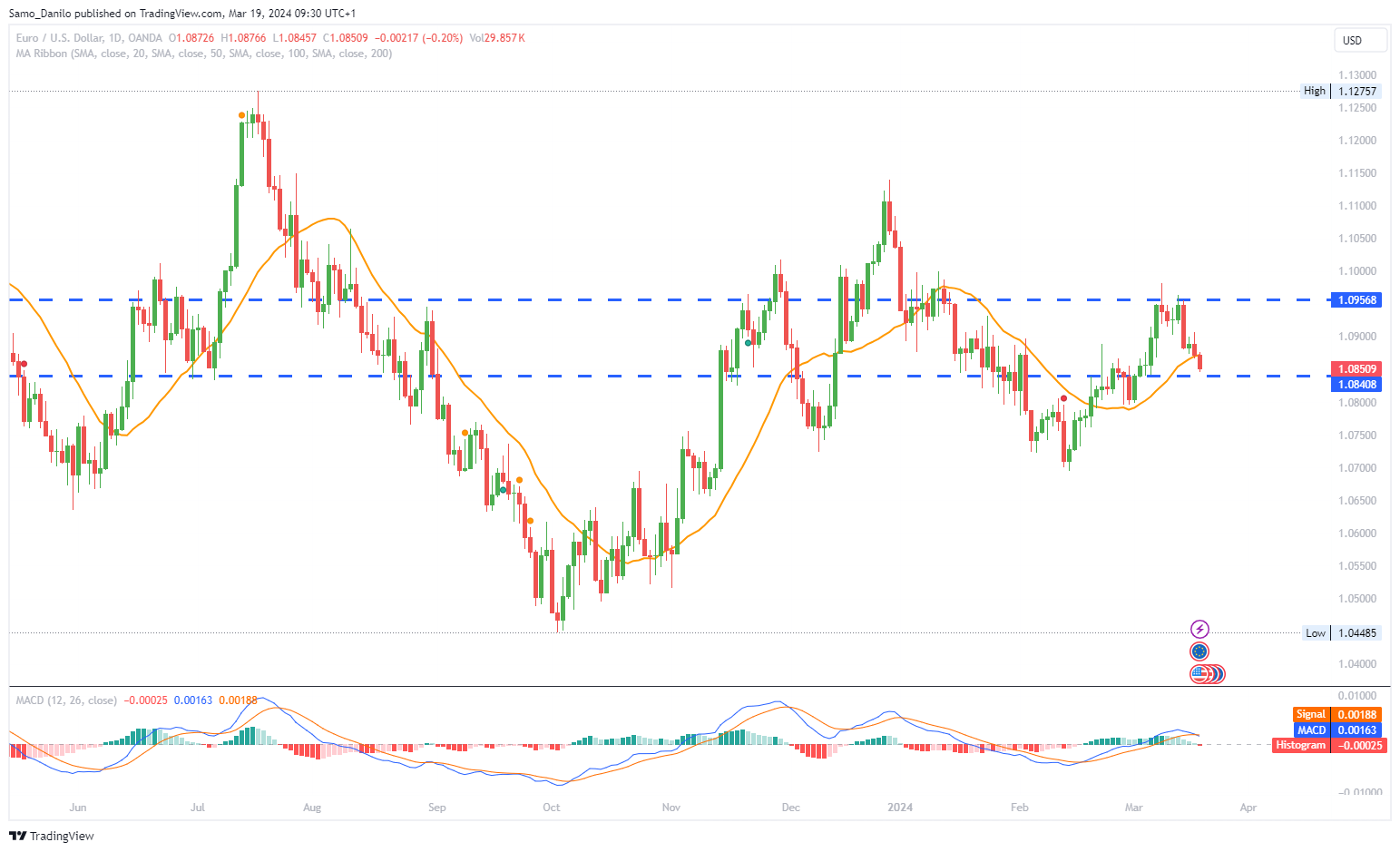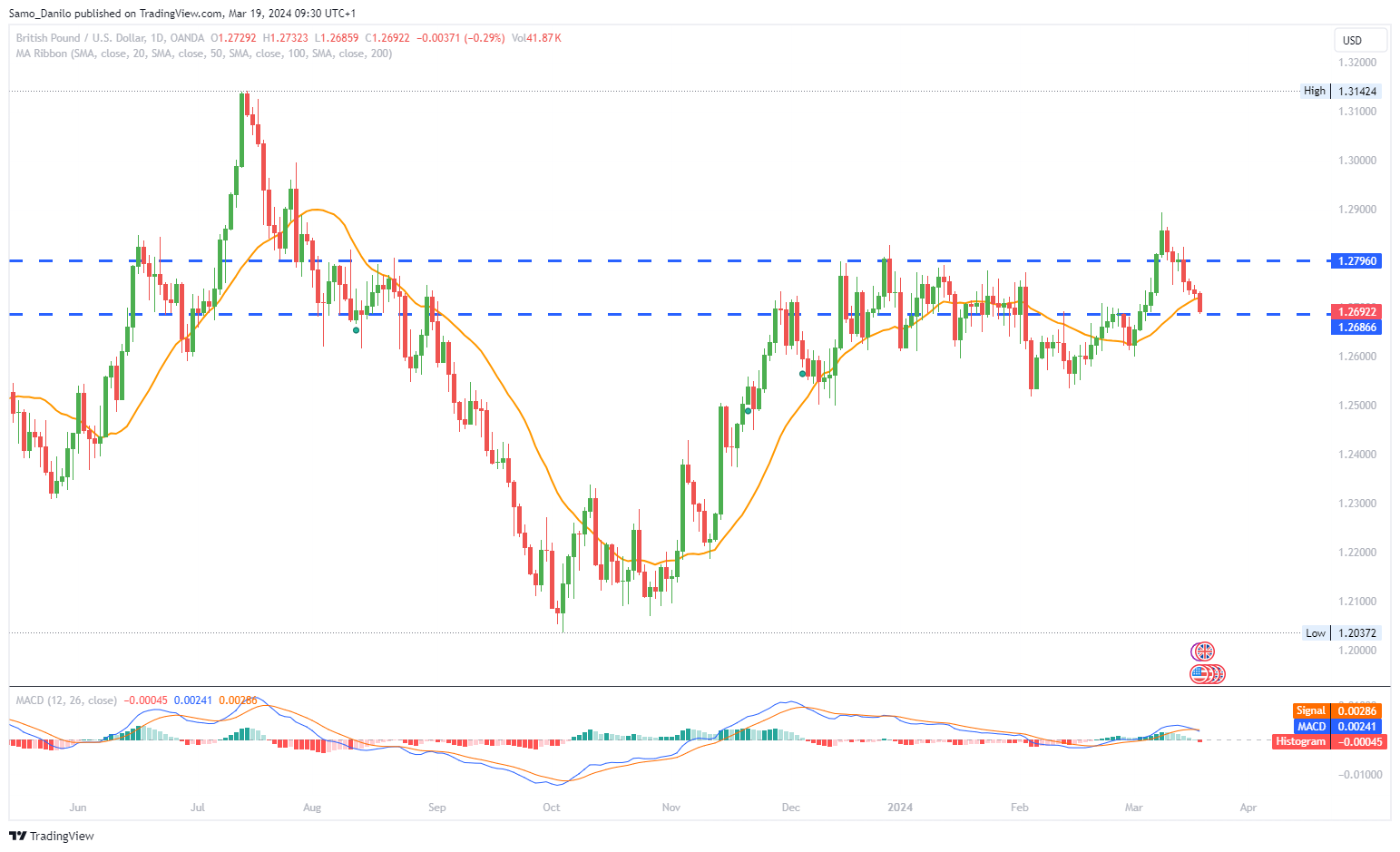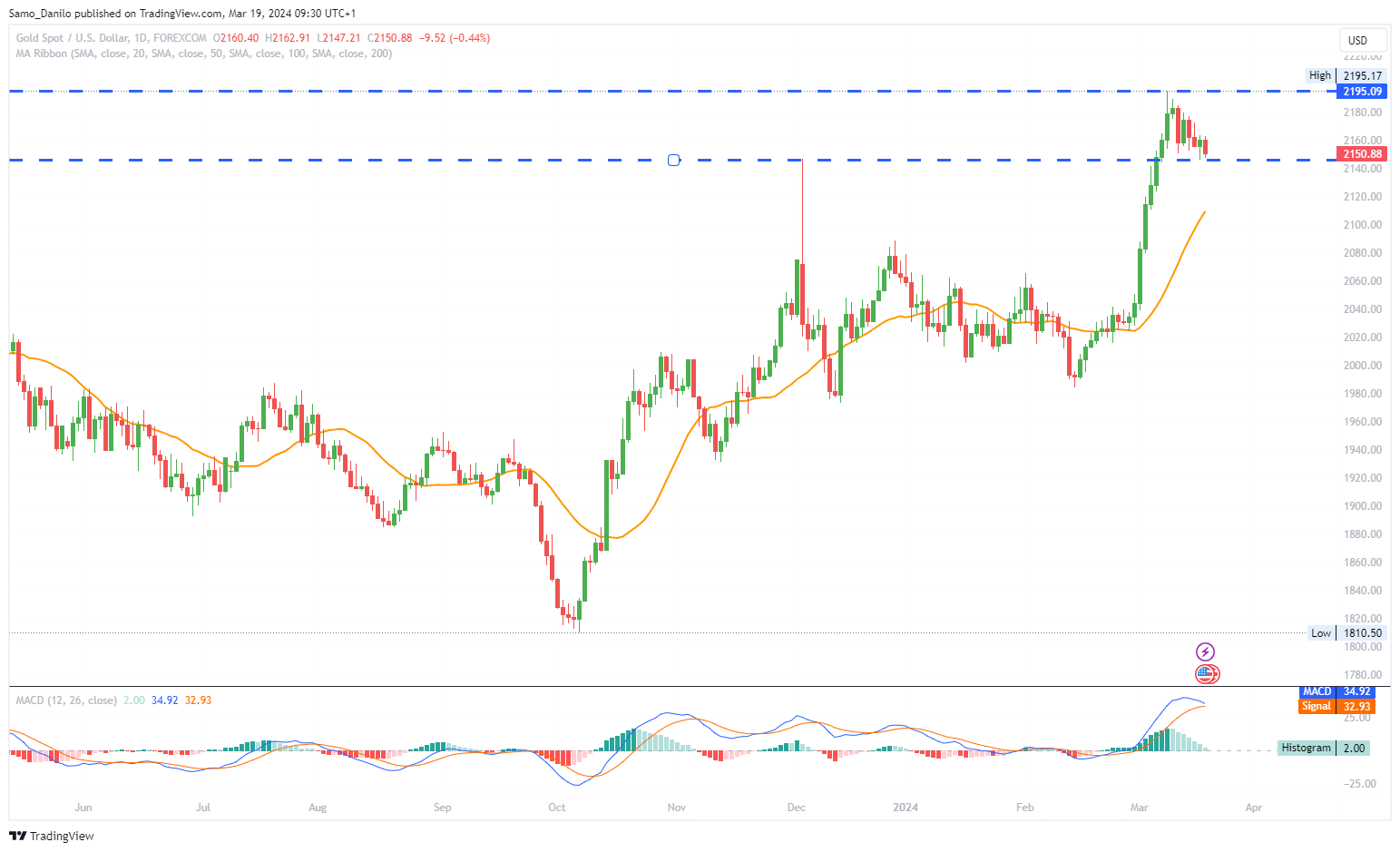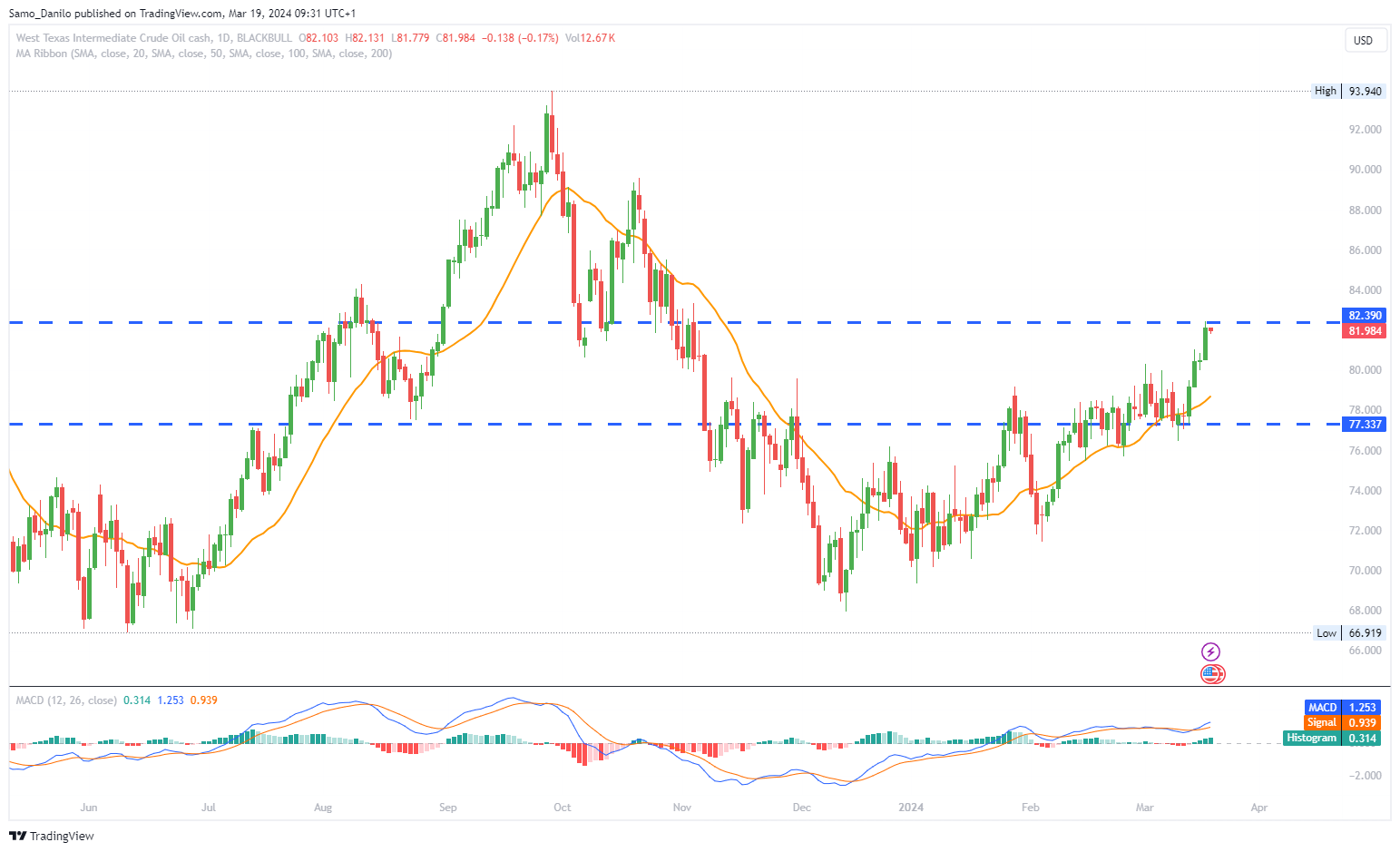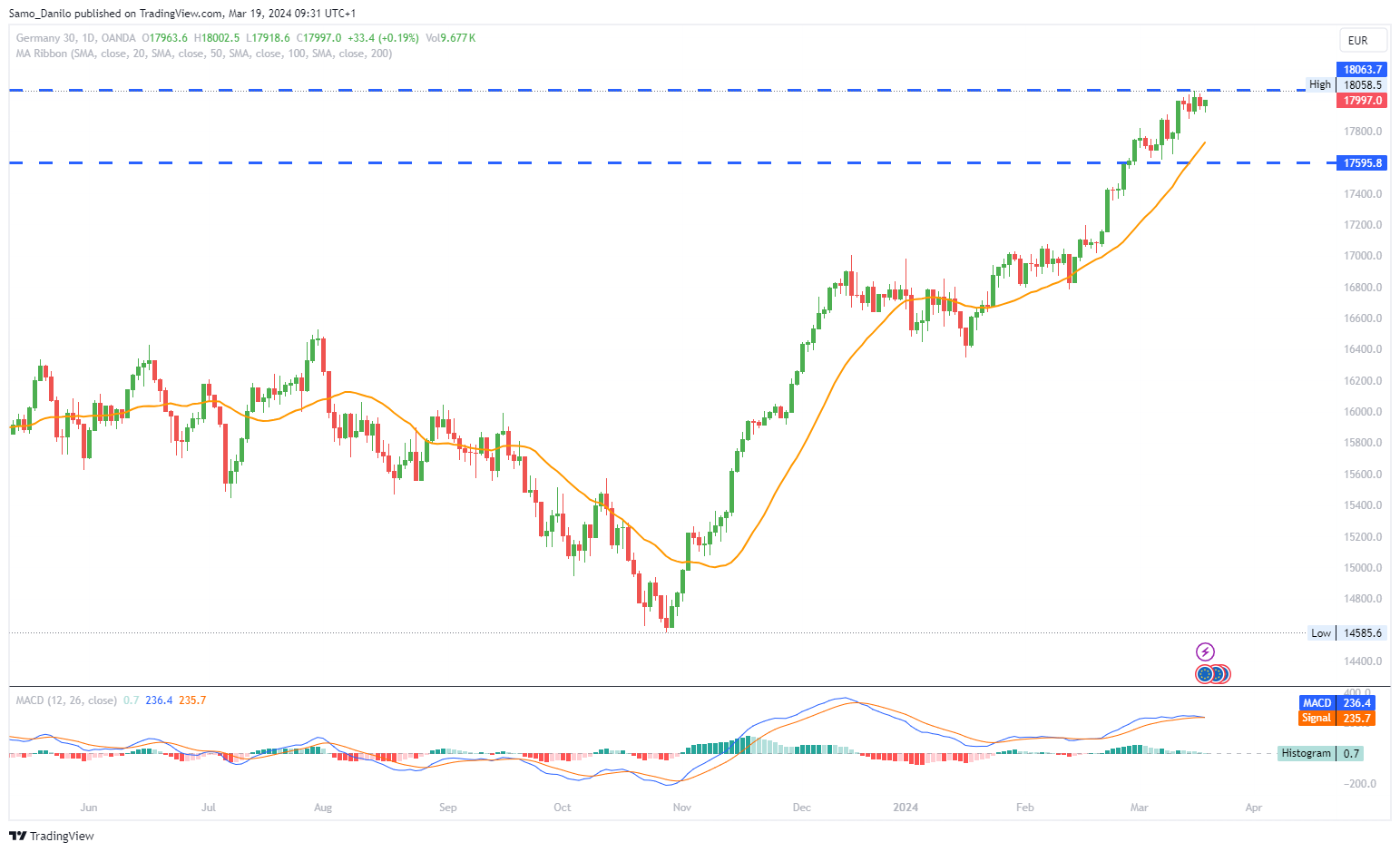EURUSD
- Range-bound Trading: EUR/USD continues to engage in range-bound trading below the 1.0900 level during the early European session on Monday. The pair is maintaining its sideways movement without displaying a clear directional bias.
- Factors Affecting Trading Sentiment: The pair's lack of decisive movement can be attributed to the stability of the US Dollar in the forex market. Market sentiment appears positive, contributing to the lack of significant movement in EUR/USD. Traders are awaiting fresh catalysts that could provide trading impetus for the pair.
- Fed Policy Announcements: Ahead of the Federal Reserve's policy announcements scheduled for Wednesday, the CME Group FedWatch Tool indicates that markets are pricing in a nearly 60% probability of a policy pivot occurring in June.
- Summary of Economic Projections: The Fed will also release its revised Summary of Economic Projections, which will be closely monitored by market participants for insights into future monetary policy decisions.
- Market Reaction Anticipation: A bullish opening in Wall Street could potentially hinder the US Dollar's ability to strengthen, creating conditions conducive to a short-term recovery in EUR/USD.
Closing statement: EUR/USD is currently maintaining its range-bound trading pattern below the 1.0900 level, lacking a clear directional bias. Traders are eagerly awaiting fresh catalysts, particularly the Federal Reserve's policy announcements and the release of its revised Summary of Economic Projections. Market sentiment remains positive, with anticipation of potential short-term recovery in EUR/USD if Wall Street opens on a bullish note.
GBPUSD
- Consolidation Above 1.2700: GBP/USD is currently trading within a range above the 1.2700 level, consolidating recent losses during the early European session on Monday.
- US Dollar Strength: Despite a risk-on market environment, the US Dollar maintains its strength, exerting downward pressure on the pair and keeping it on the back foot.
- Key Economic Indicators: On Friday, the preliminary US Michigan Consumer Sentiment Index for March declined to 76.5, contrasting with expectations for it to remain steady. This unexpected decline could have implications for market sentiment. In February, Industrial Production edged up by 0.1%, surpassing the anticipated flat reading of 0.0% and recovering from the previous month's decline of 0.5%. This could indicate some resilience in the US industrial sector.
- UK Consumer Inflation Expectations: Released by the Bank of England (BoE) on Friday, Consumer Inflation Expectations rose by 3.0%, showing a decrease from the previous uptick of 3.3%. This data prompted markets to increase their wagers on a Bank of England (BoE) rate cut in June.
- Market Reaction: Despite positive economic indicators in the US, the US Dollar's strength is overshadowing market sentiment, leading to the consolidation of GBP/USD. Anticipation of a potential Bank of England (BoE) rate cut in June, fueled by the decrease in Consumer Inflation Expectations, is also impacting market sentiment regarding GBP/USD.
| SMA (20) | Rising |
|
|
| RSI (14) | Falling |
|
|
| MACD (12, 26, 9) | Slightly Falling |
|
Closing statement: GBP/USD is currently consolidating above the 1.2700 level, influenced by the strength of the US Dollar despite a risk-on market environment. Unexpected declines in the preliminary Michigan Consumer Sentiment Index and Consumer Inflation Expectations are contributing to market sentiment, with increased wagers on a potential Bank of England (BoE) rate cut in June. Traders will continue to monitor economic indicators and central bank policy decisions for further direction in GBP/USD trading.
GOLD
- Continued Depressed Gold Price: Gold price has remained depressed for the third successive day, dropping to over a one-week trough.
- Technical Support and Resistance Levels: Any further decline in the gold price is likely to find some support near the $2,145-2,144 region. Below this level, the price could accelerate its fall to the next relevant support near the $2,128-2,127 zone.
- Impact of Elevated US Treasury Bond Yields: The outlook remains supportive of elevated US Treasury bond yields, which are acting as a tailwind for the US Dollar (USD). This dynamic is driving flows away from gold, further pressuring the XAU/USD pair.
- Federal Reserve Policy: Expectations that the Federal Reserve (Fed) will keep interest rates higher for longer are undermining XAU/USD. Traders are anticipating the outcome of the crucial two-day FOMC monetary policy meeting scheduled to be announced on Wednesday, as it will influence USD price dynamics and provide a fresh impetus to the market.
| SMA (20) | Rising |
|
|
| RSI (14) | Slightly Falling |
| |
| MACD (12, 26, 9) | Slightly Rising |
|
Closing statement: Gold price remains depressed, reaching over a one-week trough amidst technical factors and the impact of elevated US Treasury bond yields. Expectations surrounding the Federal Reserve's policy decisions, particularly from the upcoming two-day FOMC meeting, are key drivers influencing market sentiment and the direction of the XAU/USD pair. Traders will closely monitor technical support and resistance levels as well as developments in US Treasury yields for further insights into gold price movements.
CRUDE OIL
- Continued Upward Trajectory of WTI Oil Price: West Texas Intermediate (WTI) oil price continues its upward trajectory, reaching around $81.60 per barrel during the Asian trading hours on Monday.
- Positive Momentum Driven by Geopolitical Concerns: Crude oil prices are receiving positive momentum driven by concerns over potential supply disruptions arising from heightened geopolitical risks. Specifically, worries over supply interruptions have been fueled by Ukrainian attacks on Russian refineries.
- Ukraine's Announcement Regarding Gas Transit Agreement: Ukraine announced on Sunday that it does not intend to extend a five-year agreement with Russia's Gazprom concerning the transit of Russian gas to Europe, nor does it plan to negotiate a new agreement. This development adds uncertainty to the supply dynamics in the region.
- Israeli Prime Minister's Statement and Regional Tensions: Israeli Prime Minister Benjamin Netanyahu stated his intention to move forward with plans to expand into Gaza, further complicating prospects for a peace agreement. German Chancellor Olaf Scholz remarked that this move would significantly obstruct regional peace efforts.
- Anticipation of Central Bank Interest Rate Decisions: Additionally, investors are eagerly anticipating interest rate decisions from major central banks this week, which could have implications for global economic outlook and energy demand.
| SMA (20) | Rising |
|
|
| RSI (14) | Rising |
|
|
| MACD (12, 26, 9) | Rising |
|
|
Closing statement: WTI oil price continues its upward trajectory, supported by concerns over potential supply disruptions driven by geopolitical tensions. Developments such as Ukraine's announcement regarding the gas transit agreement with Russia and statements from Israeli and German leaders further contribute to market uncertainties. Additionally, investors are closely monitoring central bank interest rate decisions for insights into the global economic outlook and energy demand trends.
DAX
- Impact of Chinese Economic Data and PBoC Inaction: On Friday, economic data from China and inaction from the People's Bank of China (PBoC) exerted pressure on riskier assets. House prices in China declined by 1.4% year-on-year in February, following a 0.7% decrease in January. The larger-than-expected fall in house prices raised concerns about the Chinese economy.
- ECB Chief Economist's Comments on Labor Market: ECB Chief Economist Philip Lane provided relief amidst rising bets on a June ECB rate cut. Lane remarked that the labor market is softening in many ways, with vacancy rates decreasing and firms being less fearful about labor shortages. These comments offered some reassurance to investors.
- Focus on Economic Data from China: Economic data from China is expected to set the tone for the Monday session too. Investors will closely watch indicators such as retail sales, unemployment, fixed asset investments, and industrial production figures for insights into the health of the Chinese economy.
- Eurozone Economic Indicators on Monday: Economic indicators for the Eurozone will also attract investor interest on Monday. Finalized inflation figures and trade data will be in focus, providing further insights into the economic conditions in the Eurozone.
- Absence of German Economic Indicators: There are no economic indicators from Germany for investors to consider on Monday, shifting the focus primarily to data from China and the broader Eurozone.
| SMA (20) | Rising |
|
|
| RSI (14) | Rising |
|
|
| MACD (12, 26, 9) | Rising |
|
|
Closing statement: The DAX faced pressure on Friday due to disappointing economic data from China and inaction from the PBoC. However, comments from ECB Chief Economist Philip Lane provided some relief to investors. Economic data from China and the Eurozone will remain key drivers of market sentiment on Monday, with a particular focus on indicators such as retail sales, unemployment, inflation, and trade data.
